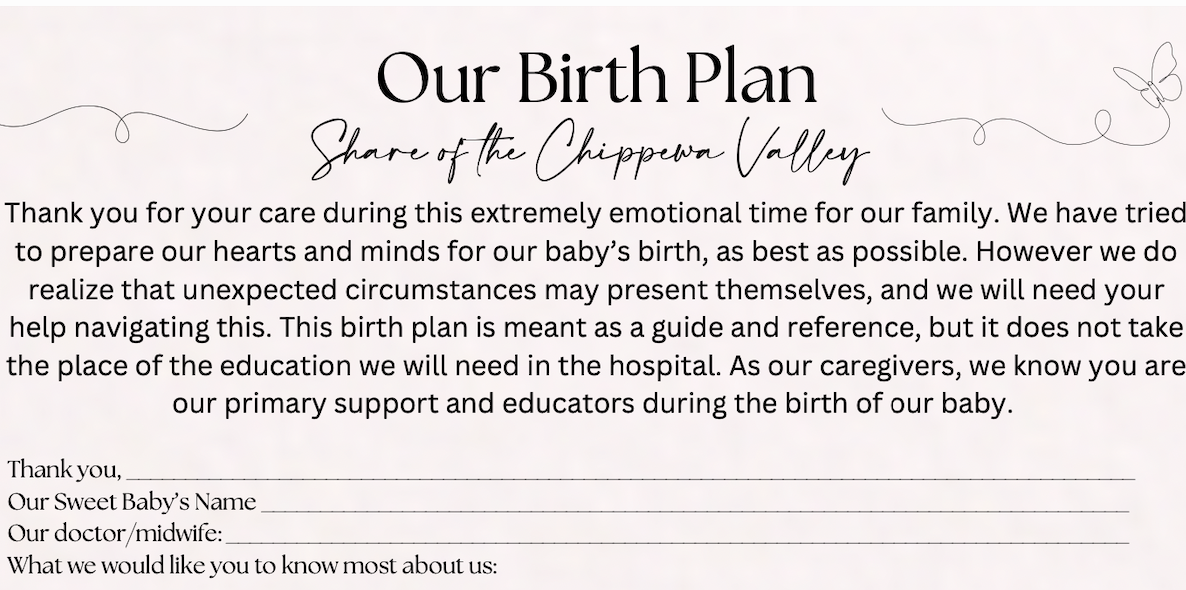
Antenatal Bereavement Support
Walking with families as they’ve received a terminal diagnosis for their baby.
We are honored to help support you before the birth of your baby.
Share of the Chippewa Valley understands and knows every family grieves differently.
We want you to know that we respect their choices regarding how you want to proceed with your care, memorials, and support.
What to expect with our antenatal bereavement services?
You will be connected to a labor and delivery nurse who has experience of what to expect in the hospital.
We will walk through what to expect during the delivery of your sweet baby. Together we will work through difficult questions the hospital nurses may ask before you go into labor. We do this by going through a Birth Plan specific to your individual needs. We start to work through your anticipatory grief.
Anticipatory grief means feeling sad before the loss occurs. Rather than grieving for your baby, who is still with you, you may feel grief for the things you won't get to do together in the future. When facing a significant loss, such as the death of your baby, it is natural to feel many strong emotions.
We will be here to help you navigate and face these tough feelings and difficult questions. We want the delivery of your precious baby to feel like a celebration of their life, surrounded by those special to you.
Preparing for the arrival of a baby who is not expected to survive is an incredibly emotional journey. It’s important to approach this experience with tenderness and compassion for yourself and your loved ones. Here are some ways to gently prepare your hearts and minds in advance of the delivery:
Seek Support
Reach out to supportive friends, family, or professionals who understand what you’re going through. Joining support groups, either in-person or online, can help you connect with others who share similar experiences.
Create a Birth Plan
Consider discussing your wishes for the delivery with your healthcare provider. This can include how you want the environment to feel, who you want present, and any special practices you want to include. Having clarity can help ease anxiety and ensure your wishes are honored.
Prepare for Memories
Think about ways to create lasting memories with your baby. This could include taking handprints or footprints, having a professional photographer capture your family’s time together, or writing a letter to your baby. These tangible memories can be a source of comfort.
Discuss Your Emotions
It's okay to feel a mix of emotions—sadness, anger, and love all at once. Consider journaling your thoughts or talking to a therapist specializing in grief. Expressing your feelings can be a helpful way to process your experience.
Educate Yourself
Understand the circumstances surrounding your baby’s condition. Knowing what to expect can help you feel more in control when it’s time for delivery.
Set Up a Comfortable Environment
Think about how you would like your delivery room to feel. Bringing personal items, such as blankets, photos, or favorite music, can create a more comforting atmosphere.
Focus on Love
Amidst the sadness, try to focus on the love surrounding this precious life, however brief it may be. Cherishing the time you have, no matter how short, can help remind you that this experience, while painful, is also one of deep connection and love.
Plan for Afterwards
Consider what you might need in the days and weeks following delivery. This could be practical support with meals and errands, or emotional support through friends or a counselor. Having a plan can help ease some of the burden during an incredibly challenging time.
Remember, this journey is personal and there’s no right or wrong way to navigate it. Each step taken to prepare is a testament to the love you hold for your baby. Be gentle with yourself as you embrace this experience.
